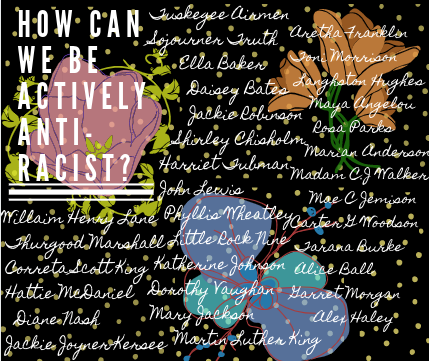How Can We Be Actively Anti-Racist?

Columnist Kiera Burns outlines what we can do to be anti-racist.
March 31, 2020

With Black History Month behind us, it is vital to remember that the fight for racial justice in America must be pursued year round if our country is to heal from its history of oppression.
This requires more than racial tolerance, more than celebrating the contributions of the Black community, and more than pretending to be colorblind (please don’t). Antiracism goes beyond this. It involves direct action in opposition to racism and discrimination against minorities.
According to best-selling author of Stamped From the Beginning: The Definitive History of Racist Ideas in America and How to be an Antiracist, Dr. Ibram X. Kendi, “The opposite of racist isn’t ‘not racist.’ It is ‘anti-racist.’
What’s the difference? One endorses either the idea of a racial hierarchy as a racist, or racial equality as an anti-racist. One either believes problems are rooted in groups of people, as a racist, or locates the roots of problems in power and policies, as an anti-racist. One either allows racial inequities to persevere, as a racist, or confronts racial inequities, as an anti-racist.
There is no in-between safe space of ‘not racist.”
At LFHS members of EmbRACE, a racial equity club open to any student interested in having conversations about race and advancing racial justice, are fighting to get this message. I meet with EmbRACE club members along with their advisor, Ms. Amy Lyons, to discuss how best to become anti-racist. They shared valuable information and tips that the world needs to hear.
Self-Reflection
Start with yourself. Reflect on how what is considered “normal” came to be and is re-enforced throughout society. Often, these societal norms are Eurocentric and established by white culture. For example, some people describe themselves as American to indicate being Caucasian.
This is problematic because upholding whiteness as the norm can result in “othering” those who fall outside of these established norms. Unless you live under a rock, you are aware of stereotypes. This in itself isn’t a problem. But it’s important to reflect on how stereotypes can lead to prejudice, and further into discrimination, if left unexamined.
Club members agreed that it’s important to “unlearn what society has taught people to assume about people of color”. Microaggressions are another outgrowth of stereotypes, which refer to insensitive slights directed at marginalized people that highlight the societal norms by which people are often judged.
According to club members Leo Anderson and Gisele Spooner, microaggressions are more problematic than people might think. These remarks (i.e. “Why don’t you play basketball?” or “You’re the whitest black person I know.”) reinforce stereotypes of people of color and minimize the weight these comments hold.
Expect Discomfort and Resist Being Defensive
Being anti-racist requires people to step out of their comfort zone. Discomfort should be expected and that is okay. Recognize that systemic oppression is often invisible to those who don’t experience it, as are the unearned advantages that are inherent in whiteness.
“It is really hard for people to wrap their minds around . . . but it’s something that needs to be recognized,” Spooner said. The idea of privilege can often trigger a defensive reaction when misunderstood.
White privilege does not mean that someone has an easy life without struggle or that one hasn’t worked hard to get to where he or she is. It refers instead to the unearned advantages that come as a result of whiteness, primarily the advantage of being treated first as an individual and not as a member of a collective identity, or the advantage of being given the benefit of the doubt and being assumed a law-abiding citizen.
“Due to the privilege that I have with the color of my skin and as someone who is evidently white, I believe that I have a role, and people who have such privilege have a duty . . . to be very persistent in trying to create an anti-racist society,” said senior club member Natalie Logue.
When a person of color shares an experience with race or confronts a microaggression, instead of reacting defensively, try to listen for understanding. Defensiveness will only serve to maintain the status quo.
Do your Homework
Although there has been movement toward racial equality, minorities too often face systemic discrimination in housing, equal pay, school funding, police violence, employment issues, and environmental pollution. There are a number of ways to educate yourself about the history that led to inequities that still confront marginalized communities. Here are a few resources to consider as a starting point:
- How to Be an Antiracist by Dr. Ibram X. Kendi, professor at American University and founder of the Antiracist Research and Policy Center. Join one of the local book clubs that are currently reading this book nationwide, or take a look at an article that summarizes its key takeaways at https://mashable.com/article/how-to-be-antiracist/.
- Stamped: Racism, Antiracism, and You, is written for a younger audience and co-authored by Kendi and popular young adult novelist, Jason Reynolds, released this month.
- Is Everyone Really Equal by Robin DiAngelo and Özlem Sensoy. This book addresses social inequities that result from any form of systemic -isms.
- Robin DiAngelo, a White antiracist, was scheduled to speak at Evanston Township High School through the Family Action Network about her other book, White Fragility: Why it’s so Hard for White People to Talk about Racism, in a canceled event on March 16. A recording of her talk will be released at a later date at https://www.familyactionnetwork.net/events/white-fragility/
- 13th, nominated for Best Documentary in 2017 is available on Netflix. Directed by Ava DuVernay, scholars, politicians, and activists examine how a loophole in the 13th amendment is linked to the mass incarceration of Blackand Latinx people.
- There are a number of podcasts that can keep you informed. Code Switch and The Break Down are just a couple.
After you educate yourself about structural racism that still persists, consider supporting an organization that needs volunteers or donors who will advance its initiatives.
Interrupt Racism as a Bystander
It takes courage. Absolutely. It’s uncomfortable and easier to ignore, but ignoring racism is another form of participating. Interrupting racist remarks or ideas challenges the normalcy of the statement.
If you hear someone use the N-word, thinking it’s okay because it is used in a song, interrupt it –even if only to say “That’s not cool.” In the least, shake your head in disapproval. Call out microaggressions.
If you hear racist remarks directed toward Asians in misdirected blame for the COVID-19 pandemic, interrupt. Remember that being antiracist is an ongoing effort. Either our efforts are supporting racist ideas and policies or they’re supporting anti-racist ideas and policies.
Everyone is on an individual journey toward understanding the role of race in one’s life, and though we will make mistakes along the way, it’s essential that we don’t stop trying to do our part to advance racial justice.
“Shallow understanding from people of goodwill is more frustrating than absolute misunderstanding from people of ill will. Lukewarm acceptance is much more bewildering than outright rejection.”
-Martin Luther King Jr.







"Contrarian Polemicist" • Apr 1, 2020 at 3:13 pm
This article could not be more condescending. It is the classic virtue signaling and lecturing coming from the left to everyone else about how they should think. First of all, we need to dispel this idea of “whiteness”. That is an incredibly lazy and uneducated way at looking at demographics. Not all “white people” are the same, mind you. An Italian is very different from a Swede, a Spaniard is very different from a Russian, and an Irishman is very different from a Croatian. These individual groups have vast and different histories and cultures, and to lump them all into “white” (which is an Anglo-Saxon created term in and of itself) is irresponsible and flat out disrespectful. When talking about how “white” people were responsible for slavery, I certainly do not think Serbs or Norwegians or Hungarians do not want to be lumped in with the European groups that were more active in the slave trade. Second, let’s discuss the following quote from your article: “upholding whiteness as the norm can result in “othering” those who fall outside of these established norms”. It can be inferred from this statement that “whiteness” should not be held up as the norm in order to protect minorities. I get it, and I agree, in a racially diverse country such as the United States or Brazil, yes whatever “whiteness” is should not be held as a norm because you would be excluding a significant portion of the population. You were not specific to these countries though, so I must address that. Now I do not know what whiteness means, but let’s just assume that it means the dominant European ethnic group or group of European ethnic groups in a country. How is that possibly fair that you are lecturing countries like the United Kingdom, France, Italy, or Germany that they must concede some elements of their dominant culture? America does not belong to one ethnic group. Nor does it belong to one race. But are you going to tell me that the United Kingdom does not belong to Brits, that France doesn’t belong to the French, Italy doesn’t belong to the Italians, and Germany doesn’t belong to the Germans? That would be an absurd suggestion. If we were to do that, then wouldn’t it only be fair that every country in the world stopped upholding their dominant culture? That would be extremely unpopular, and just not fair. If you are talking about America specifically, you need to specify. You brought Europe into by using the term Eurocentric. Not to be petty, but can we please talk about Caucasian too? Caucasian means you come from the Caucasus Mountains, which is a very small part of the world which is arguably not even in Europe. Look I get it that that is among the oldest places where those resembling modern day Europeans are found. But it is a lazy and factually incorrect term that exposes that you have no idea what you’re talking about. Let’s stop using the term Caucasian, and though white is a dumb term too, that one is worse. Next quote: “Reflect on how what is considered “normal” came to be and is re-enforced throughout society. Often, these societal norms are Eurocentric and established by white culture. For example, some people describe themselves as American to indicate being Caucasian.” You are implying that their is something wrong with Eurocentric culture. I understand that if we take a portion of the population that is/was being forced to conform to Eurocentric culture and examine how that came to be, that root would be through colonization, imperialism, etc. I get it. And you are not directly doing this, which is good, but you are slightly implying through context that Eurocentric culture is just a bad thing. Why can’t we appreciate it like any other culture? There are no complaints levied against those who are not East Asian enjoying East Asian culture and cuisine, there are no complaints levied against those who are not Indian enjoying Indian culture and cuisine, and so on. This article is written way too condescendingly with way too many factual inconsistencies to be considered serious. You make some decent points, but it is just written with such vitriol towards those who have ANY opinion other than your own, and I think that alienates a lot of people.